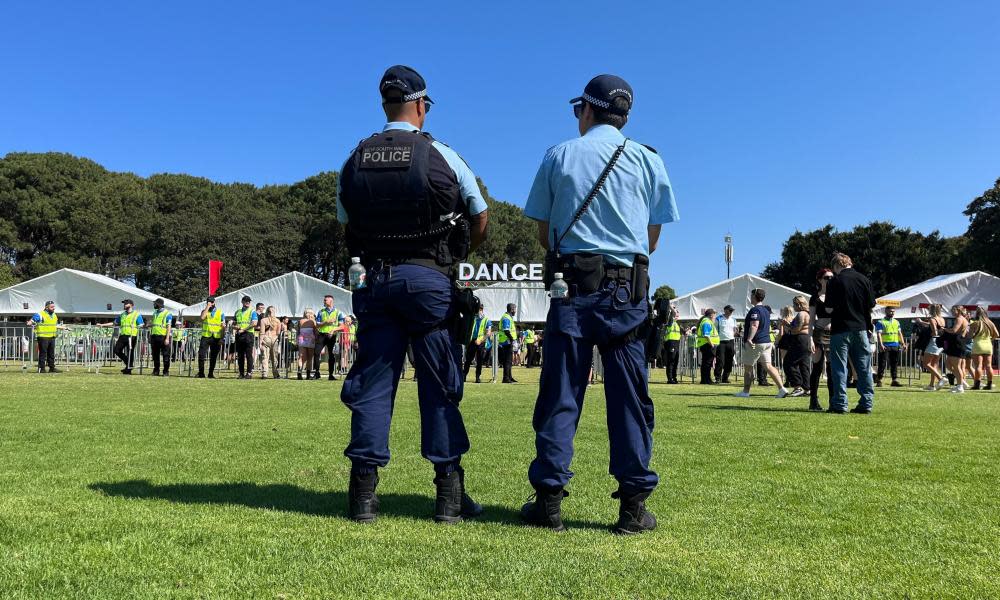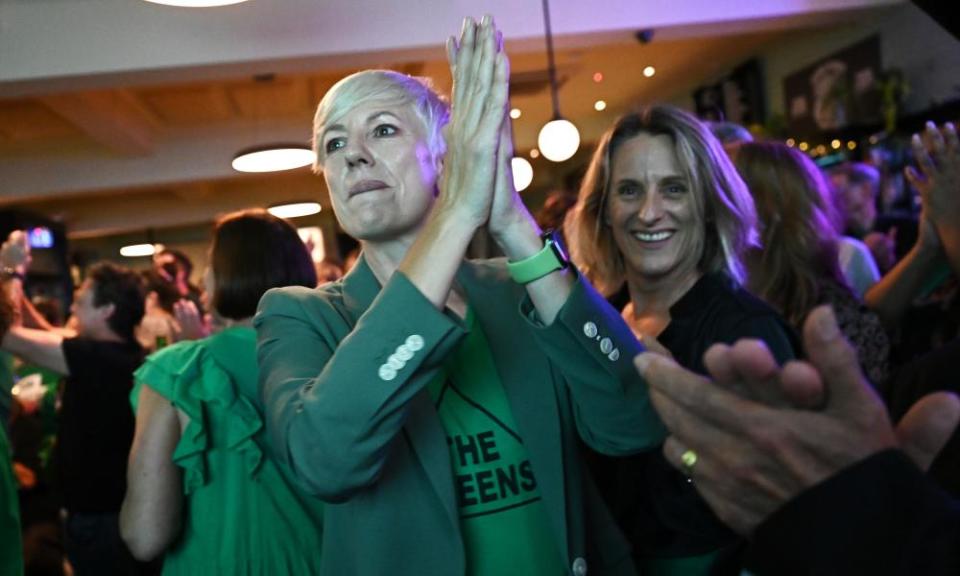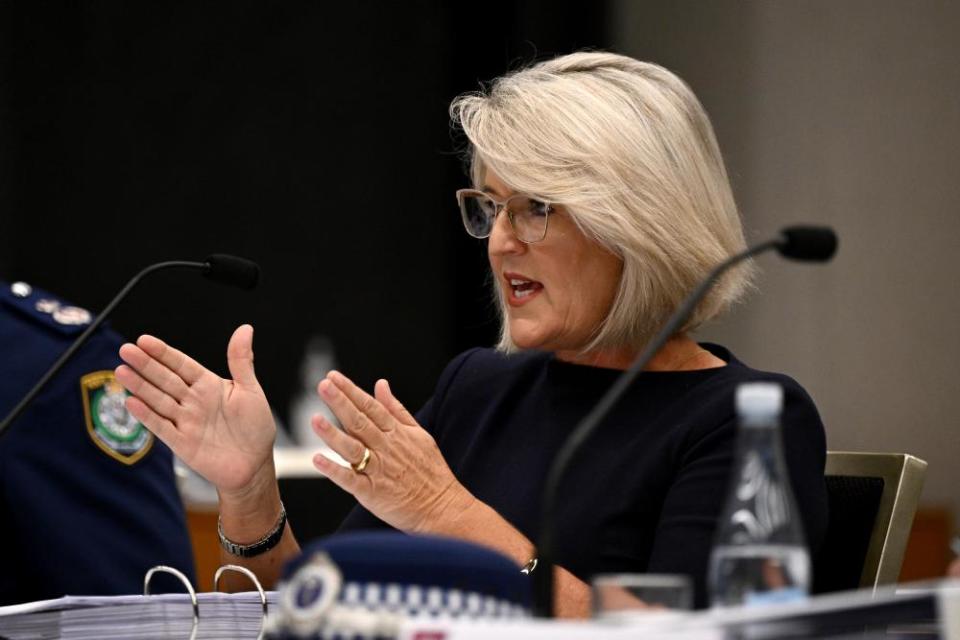NSW police accused of ‘killing’ music festivals by charging excessive fees

New South Wales police have been accused of “price gouging” and operating a “rort” that threatens the viability of music festivals, by charging tens of thousands of dollars more than their counterparts in other states to patrol the events.
The Greens MP Cate Faehrmann told NSW parliament this week that a recent festival that played across three states paid $107,852 for policing for 16,000 people in NSW, but just $45,000 for 14,000 people in both Victoria and Queensland.
“That price gouging is unique to NSW,” Faehrmann said on Tuesday.
“It is a police rort and it is killing music festivals in NSW.”
The Australian Festival Association (AFA) told the Guardian of even more extreme discrepancies, including one festival where NSW police charged $67,000 for patrolling a 22,000 crowd, while the force’s Victorian equivalent charged only $7,500 for a crowd of 30,000. In Queensland, the same show cost $37,000 for a crowd of 20,000.
Related: Australia’s live music scene ‘decimated’, with 1,300 venues lost since pandemic
Under changes to the law in 2019, the NSW Independent Liquor and Gaming Authority takes recommendations from police and health authorities to decide whether a music festival is “subject”, meaning organisers must meet higher medical and harm reduction standards and submit a safety management plan.
Mitch Wilson, the AFA’s managing director, said there was no good reason for the huge difference in costs across states.
“If you’re a subject festival [in NSW], the police set the numbers and the user must pay,” Wilson said. “There is no justification why NSW is so much higher, that NSW is an inherently unsafe place compared to Victoria or Queensland.”

Faehrmann cited September’s Listen Out Sydney festival being forced to pay $242,000 for 164 user-pays police officers (those working outside usual rostered hours) in addition to 116 officers allocated to the Centennial Park event.
“Police are deciding whether music festivals and other events should have to engage its services and how much they should be charged, and then the police are charging outrageous amounts, which is resulting in some events choosing to bypass New South Wales on their festival schedule,” Faehrmann said.
Wilson said since the change in the law four years ago, the cost of user-pays policing and ambulance services for a music festival in NSW could be as much as 400% more than for the same event staged in Queensland or Victoria. But because festival-goers expected ticket pricing to be consistent across states, festival organisers just had to absorb the additional NSW costs.
“The costs being so much higher means the breakeven point for the organiser is a lot higher for the New South Wales leg,” he said.
“It just means that organisers are pretty cautious about bringing events to New South Wales. But it’s also the biggest state, and right in the middle, so to make the economics as a whole work, and the shipping around of all of the equipment, it doesn’t really make a lot of sense to take stuff from Brisbane to Melbourne to Adelaide, and not to Sydney as well.”
Under Victorian law, if festival organisers argue that the imposition of police charges will threaten the viability of their event, they can appeal to Victoria police’s chief financial officer to have the costs waived entirely.
The For The Love festival, which toured last summer, did so successfully and so paid nothing for policing in Victoria. But in NSW, where there is no equivalent appeal mechanism, For The Love was charged $33,855.80 for user-pays policing of 11,000 attendees.
“There is no transparency and there is no review process to challenge or seek clarity if event organisers disagree with the assessment,” Wilson said.
Fee schedules for user-pays policing obtained by the Guardian show that it is the sheer number of police deployed in NSW that is driving prices up, rather than labour costs.
Festival organisers are charged $144 an hour for every officer attending an event in NSW, compared with $162 in Queensland and up to $177.40 in Victoria, depending on rank.
Police commissioner has ‘absolute discretion’
NSW police declined to respond to questions from Guardian Australia, but pointed to the user-pays policing services policy on its website.
That policy says a number of risk factors are taken into account when deciding the minimum number of police needed to maintain order under the Police Act, including venue size, the age group of attendees, alcohol availability and previous incidents at similar events.
The commissioner of police “has absolute discretion to set the police resources requirements for an event” the policy states, and has the power to “demand payment to recover the cost of police deployed”.
Faehrmann said there was a clear conflict of interest, with police deciding how many officers are needed at festivals, and then receiving “significant pay in terms of overtime”.
In 2018, the three-day Bohemian Beatfreaks festival moved its location from Casino in northern NSW across the border to Queensland, after being quoted a $200,000 bill for user-pays services.
In 2019 the Mountain Sounds festival cancelled its Central Coast event after being quoted $200,000 for 45 user-pays police officers, working a 24-hour schedule.

Parliament heard on Tuesday that in 2017-18 NSW police earned $21.5m from its user-pays services, representing a fourfold increase over the previous decade.
A spokesperson for the NSW police minister, Yasmin Catley, declined to provide the figures for the past two years, but said they would be made public in coming weeks. Catley’s office did not respond to questions about Faehrmann’s criticism of NSW police.
The NSW arts minister, John Graham, said there had been “a war on our festival sector” in recent years and a review of the NSW Music Festivals Act was now under way.
“The government is concerned that the overall cost of hosting festivals is higher in NSW compared to other states [but] any changes should not be at the expense of safety for festival-goers,” Graham said in a statement.
A review of the Music Festivals Act is expected to be completed next year.


